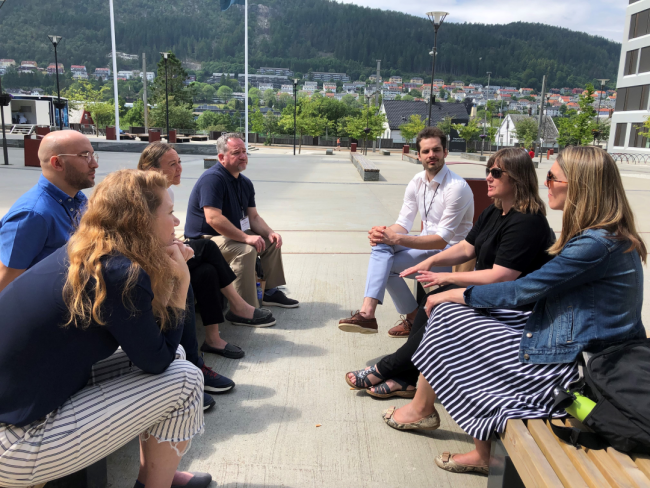You have /5 articles left.
Sign up for a free account or log in.

Babson College leaders partnered with Nord University to deliver virtual international education to graduate students at Western Norway University of Applied Sciences in Bergen, Norway.
Babson College
The COVID-19 pandemic reduced or halted international travel outside the U.S. for many college students, but students’ appetite for intercultural learning has remained strong.
To meet this demand, Babson College in Massachusetts partnered with Nord University in Norway to participate in the American Association of Colleges and Universities institute on virtual exchange/collaborative online learning (VE-COIL), sponsored by the Norwegian government.
“Do you really have to get on a plane … to have a profound global learning experience, or are there ways in today’s technologies and pedagogies to achieve some of those objectives?” asks Amir Reza, dean of the Babson Academy of Global Entrepreneurial Learning and of global education.
Babson’s is one of nine international VE-COIL partnerships involving 19 institutions from the U.S., Norway and Japan. Participating colleges and universities started meeting in March to establish their own programs to co-teach multicultural online coursework.
Starting next spring, Babson and Nord’s program will unite master’s students studying business at their respective institutions to collaborate on a six-week project and gain intercultural competencies and other skills.
The background: Babson is known for global learning, in its diversity, quantity of international students on campus and study abroad opportunities. Around a third of its undergraduates are from outside the U.S., representing 84 countries. And the college has earned top rankings in the Institute for International Education’s Open Doors report for short-term education abroad, participation in education abroad and total number of international students.
Global experiences for U.S. students generally require some form of student travel—a student participating in a research project with a Babson faculty member abroad or studying at an international campus, for example. But a variety of students miss out on these experiences due to factors such as cost, time commitments or personal health concerns.
Babson leaders therefore wanted to create global opportunities for their students within their own college. The result: VE-COIL.
Abroad at home: The relationship between Nord and Babson began years ago with Babson Academy’s membership organization, a consortium of 38 institutions from 26 countries, so Nord was a “natural ally and partner” for VE-COIL, Reza says.
Thirty students enrolled in business communication classes at Nord and Babson will participate in the exchange. Faculty members will teach different curricula at their respective institutions during course hours but block an additional three Friday meeting times for student teams to interact synchronously.
The Babson course in question has been offered at the college for several terms, just without the international collaboration portion. It is loosely based off another undergraduate course, which unites undergraduates from Babson with those at the University of Southern California’s Marshall School of Business to complete a six-week social media assignment for a corporate partner using Slack.
Babson and Nord graduate students will be split into small groups to work on their six-week project. They’ll be required to meet with their international peers three to four times.
Norway is six hours ahead of Massachusetts, so students will meet at 8 a.m. in the U.S. and 2 p.m. in Norway. Program leaders have already encountered technological and time difference issues between their respective locations, so they anticipate students will face the same hurdles, particularly working students.
Initially, time spent with Nord will be focused on team building, creating trust and establishing interpersonal relationships through the lens of intercultural development. Because all students involved are graduate-level learners, course instructor Kristen Getchell, an associate professor of business at Babson, envisions they will all have similar foundational skills. The challenge will be establishing a common language among them, she adds.
The development: Program leaders are finalizing the project this summer and seeking an external business partner to provide the problem for students to solve. The course outline, learning objectives and indirect measures are all under evaluation. Another consideration is creating a way to incentivize and recognize students who participate, such as creating a digital badge.
Babson professionals will also establish foundations for future research and development of the program, creating a guidebook for other faculty members who hope to do something similar.
Reza hopes the course creates a (positive) contagion within the Babson community to deliver global learning to hundreds of students in innovative ways. The goal is not to replace programs involving student travel abroad, but to create an extension and complement, he says.
Getchell adds that this will positively impact students’ professional networks, creating strong and diverse international relationships across borders.
Seeking stories from campus leaders, faculty members and staff for our Student Success focus. Share here.
This article has been updated to correct the spelling of Kristen Getchell's name.




